In the tranquil village along the banks of ASA River,along Odo Ore community , a sub hub of Ilorin ,kwara state Dauda and Ishepa, seasoned fishermen with a decade of experience, express growing concerns about the profound impact of climate change on their livelihoods. In separate interviews, they shed light on the challenges they face, attributing dwindling catches to the discernible effects of global warming.
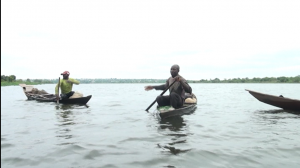
some fishermen on Asa river
Aliyu Dauda, his face weathered and etched with the tales of countless days on Asa River, paints a vivid picture of the challenges faced by the local fishermen. “The relentless rise in water temperature is like an unwelcome guest. It has disrupted the harmony of the river, driving our elusive catch to seek refuge in cooler waters,” he laments, his gaze fixed on the once-teeming river that now seems to hold fewer promises.
Edor Ishepa, a seasoned companion in this aquatic struggle, further elaborates on the multifaceted challenges gripping their livelihoods. “Beyond the evident temperature surge, we grapple with the whims of erratic weather patterns. Unpredictable storms lash out, making our already demanding job even more perilous. Changes in water currents add another layer of complexity, turning our once familiar river into an unpredictable adversary,” Ishepa remarks with a furrowed brow, highlighting the increasing unpredictability that now characterizes their daily ventures.
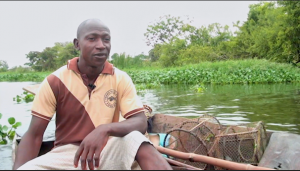
Edor Ishepa
With a heavy sigh, Dauda continues, “It’s disheartening to witness the diminishing abundance of fish. They used to dance in these waters, but now it’s as if they’ve found refuge elsewhere, leaving our nets emptier than ever before. Our catch has become a shadow of what it once was.”
Ishepa nods in agreement, adding, “The delicate balance of nature is disturbed. Our safety is also at stake. Stronger storms catch us off guard, and the changing currents make navigating these waters a constant challenge. We’ve had to adapt, but the question is, how much longer can we keep up with nature’s unpredictable fury?”
As the two fishermen share their struggles, the gravity of the situation becomes palpable. The river, once a source of sustenance, now mirrors the broader consequences of environmental shifts.
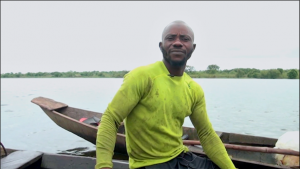
Dauda Aliyu
Their words echo the urgent need for attention to be directed towards the interconnected issues of climate change, disrupted ecosystems, and the very livelihoods that rely on the delicate balance of nature.
Two local women, who have been buying fish from Dauda and Ishepa for years, voice their concerns.
Fatima, a stalwart in the local fish trading business, leans forward with a furrowed brow, her concern evident in every line on her face. “The decline in the quantity and quality of fish is impossible to ignore. Dauda and Ishepa used to bring in bountiful catches, but now, it’s as if the river itself is holding back its treasures,” she remarks, her voice tinged with a sense of nostalgia for the thriving days of the market.
Amina, another figure in the local fish trade, nods in agreement, her expression mirroring the gravity of the situation. “It’s not just about our income; it’s about the variety of fish available to our customers. We used to offer a diverse selection, a reflection of the richness of ASA River. Now, our stalls tell a different story—limited choices, and some types we haven’t seen in months.”
The impact on pricing is a point of shared concern for both women. “With the scarcity of fish, we’ve had to adjust our prices. It’s not a choice but a necessity, considering the diminishing supply. This doesn’t just affect us; it ripples through the community, making fish less accessible to those who rely on it as a primary source of protein,” Fatima explains, her eyes scanning the market where once lively transactions are now tinged with a sense of caution.
Amina chimes in, emphasizing the broader repercussions of these adjustments. “Raising prices isn’t just a business decision; it’s a response to the changing dynamics of our environment. The consumers are feeling the pinch too. What used to be a staple in their diets is now becoming a luxury, and it’s disheartening to witness the strain on the community.”
In the backdrop of their words, the once-vibrant market seems to echo the sentiment of change, reflecting not just economic adjustments but the broader impact of climate-induced transformations.
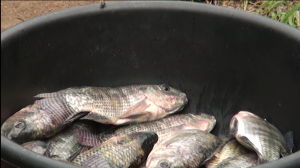
Fish from Asa river
The challenges faced by these fish buyers serve as a tangible reminder that the effects of climate change are not confined to the riverside but resonate through the intricate web of relationships that sustain the local economy.
Amidst these challenges, Olaide Olawuwo a passionate advocate for climate change action, steps forward. Olaide has been actively raising awareness about climate change and its implications on local communities. “The plight of these fishermen is a clear indication of the urgent need for climate action. We must address the root causes and work towards sustainable solutions to protect our environment and the livelihoods that depend on it.”
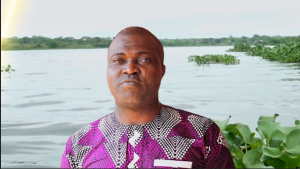
Olaide Olawuwo
Other locals, such as village chief Ibrahim, express concerns about the broader impact on the community. “Fishing is not just an occupation; it’s ingrained in our culture and sustains our way of life. If we don’t take immediate steps to combat climate change, our entire community will suffer.”
In response to these challenges, a collaborative effort is underway. Local authorities are exploring sustainable fishing practices, and community members are participating in climate resilience workshops. Olaide emphasizes the importance of such initiatives, stating, “We must adapt and mitigate the effects of climate change. Sustainable practices and community engagement are key to ensuring the resilience of our environment and the livelihoods it supports.”
Join our twitter community :


